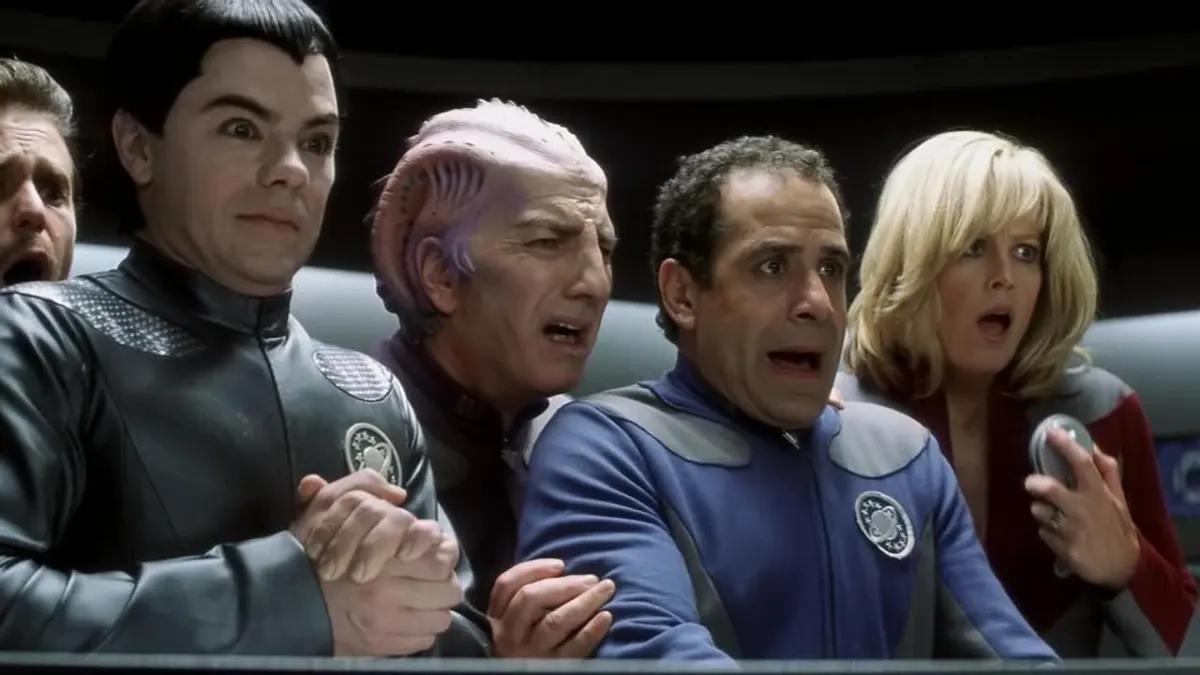Stories matter. If there’s one thing that we can agree on in a column called The New Mythology, it’s that. They do more than just entertain us. They teach us, lift us up, and show us what we can be.
So here’s a story: actors, convinced that this is just another gig, gradually realize that they are in real danger and are forced to access inner strength they didn’t know they had to stay alive. That movie, of course, is Tropic Thunder.
No, wait.
The actors are recruited by a group of simple folk who have watched their exploits and mistaken them for true stories of heroism. That movie, of course, is Three Amigos. No, scratch that too. I’m talking about the one where the simple folk are also super advanced space aliens. And THAT movie, of course, is Galaxy Quest, which celebrates its 20th anniversary this year.

Clearly, the premise is a bit worn, but Galaxy Quest uses its setting to become something sublime, a movie that manages to embody the best of the thing it’s spoofing. Galaxy Quest tells the tale of the cast of a cancelled ‘80s cult sci-fi show that’s sort of the “Is Pepsi OK?” version of Star Trek. Led by Jason Nesmith (Tim Allen playing a cross between William Shatner and Buzz Lightyear), the cast finds themselves in pretty much the same situation as the cast of Star Trek in the years following that show’s cancellation. They’re short on work, desperate for cash, and getting by almost entirely on the proceeds of demeaning convention appearances where they charge overzealous fans $15 for an autograph.
All that changes when the cast gets abducted by aliens who have no concept of pretend, take everything literally, and have watched every single episode of Galaxy Quest with the keen eye of an obsessed fan who nonetheless doesn’t know what theater is. The Thermians have modeled their entire culture on what they think are “historical documents.” That includes constructing a real version of the show’s ship, the Protector, that’s identical down to the last rivet. Now their entire nerdy species is on the verge of being wiped out by the maniacal General Roth’h’ar Sarris, and the Thermians need the legendary crew of Galaxy Quest to save the day.
That plot synopsis doesn’t capture what makes the movie so great and enduring. It doesn’t explain why Star Trek fans often include it in their ranked list of the best Trek films, why Star Trek stars like George Takei and Patrick Stewart are avowed fans, or why Pulitzer Prize-winning playwright David Mamet included it on a list of “perfect films.” It doesn’t explain why I cry every time I watch the movie.

Part of it is the casting. In addition to Allen (in possibly his best role), the movie scores big with Alan Rickman snarkily combining Alec Guinness and Leonard Nimoy as a Shakespearean actor who finds it immensely demeaning that he’s become beloved for his turn as a rubber-forehead-ed alien. Sigourney Weaver plays way against type as a bimbo without an actual job on the ship, and Tony Shalhoub snacks through the movie as a sentient cloud of pot smoke. Future Oscar-winner Sam Rockwell plays a guy (literally named “Guy”) who was killed off as a redshirt on the original show and spends the entire movie trying to avoid a repeat. Even blink-and-you-miss-them characters are played by future luminaries like The Office’s Rainn Wilson.
Part of it is the setting. The movie begins in a dingy convention center full of awkward fans and handmade costumes, which writers David Howards and Robert Gordon mine for plentiful laughs. Then it moves to space, where the actors find themselves deeply in over their heads, squaring off against a terrifying host of aliens while armed with nothing but an extensive knowledge of tropes. They find themselves re-enacting various episodes of the show to try and get out of trouble while manning a ship designed by the aliens to work just like on TV down to things like a countdown-to-death timer stopping with one second left. Just because. Throughout the action the cast snipes and bickers with one another in a way familiar to anybody who has heard behind-the-scenes stories about working with Shatner.
But a lot of it comes when the movie takes those early laughs and twists them on you later. At the convention, Rickman sneers “Next!” in his signature clipped tone at the fans who try to repeat his famous catchphrase at him while waiting in line for autographs. But later, a Thermian dies in Rickman’s arms after telling him “although we had never before met, I always thought of you as a father to me.” You can see in Rickman’s eyes the realization that all those fans were trying to tell him the same thing all along. At the convention, Allen snaps at a fan peppering him with technical questions that “there’s no goddamn ship.” Later he’s forced to tell the leader of the Thermians (a pre-Veronica Mars Enrico Colantoni) the exact same thing, to very different effect.
These aliens are innocents, and watching Allen break the news to them is like telling a toddler about Santa Claus right before murdering a puppy in front of them. Every character plays their parts straight, and so while the script mines comedy from the discrepancy of watching actors try to save the day, the emotions throughout are all legit.
But the real key is the fact that being a fan turns out to be the right move. The Thermians were able to unite their people under a single banner by emulating Galaxy Quest. The nerds from the convention hall end up saving the day with their technical nitpicking. And the actors all get their mojo back over the course of the story by embracing their characters from the show. Nobody is punished for their fandom; instead it sets them free to be their best, truest selves.
Recently, The Orville has reopened a lot of the same discussions about how to incorporate humor into a Star Trek-style show and whether or not you can consider a non-Trek property to be part of the Trek family. Star Trek: Discovery took the franchise in a bold new direction by updating its look, feel, and mission statement updated for the 21st Century. The Orville went the opposite route. Seth MacFarlane has employed many of the behind-the-scenes figures who worked on the Star Trek shows of the ‘90s, reverse-engineering a show that — aside from some jarring missteps into toilet humor — often feels like a lost Trek that would have appeared sometime between Voyager and Enterprise.

This has led to some heated discussions among the Trek fanbase. Some people claim that The Orville is the “real” current Trek show, and that Discovery is some non-canon outlier we shouldn’t talk about like Star Trek: The Animated Series or that one episode of Voyager where they break the Warp 10 barrier and turn into catfish. In some ways, Galaxy Quest opened the door to this by creating a Trek-adjacent movie that was so well done, so understanding of the source material, that Trek fans quickly incorporated it into their own canon. Once you’ve established a precedent for adding stuff into the canon, you’ve left wiggle room for kicking other stuff out.Ultimately, how those conversations shake out will probably depend on how the showrunners treat their source material. The team behind The Orville has shown no interest in these head-to-head comparisons with Discovery, instead just hoping we’ll embrace this exciting time when we have so many shows at our fingertips. Discovery has made numerous course corrections in its second season, responding to fan feedback in a way that never would have been possible during the last generation of Star Trek. The Orville has grown darker and more serious in its second season, dealing with topics like genocide with a deftness I wouldn’t have thought possible from the show’s pilot. Meanwhile Discovery has grown more light-hearted in season 2, introducing Anson Mount’s fantastic take on Captain Christopher Pike and jettisoning the grimdark elements of the Klingon War and Mirror Universe.
Leonard Nimoy wrote an autobiography called I Am Not Spock where he tried to distance himself from the character that made him famous. Years later, he realized the error of his ways and wrote a sequel, I Am Spock. In-between, he recognized what Galaxy Quest recognizes: stories matter.




